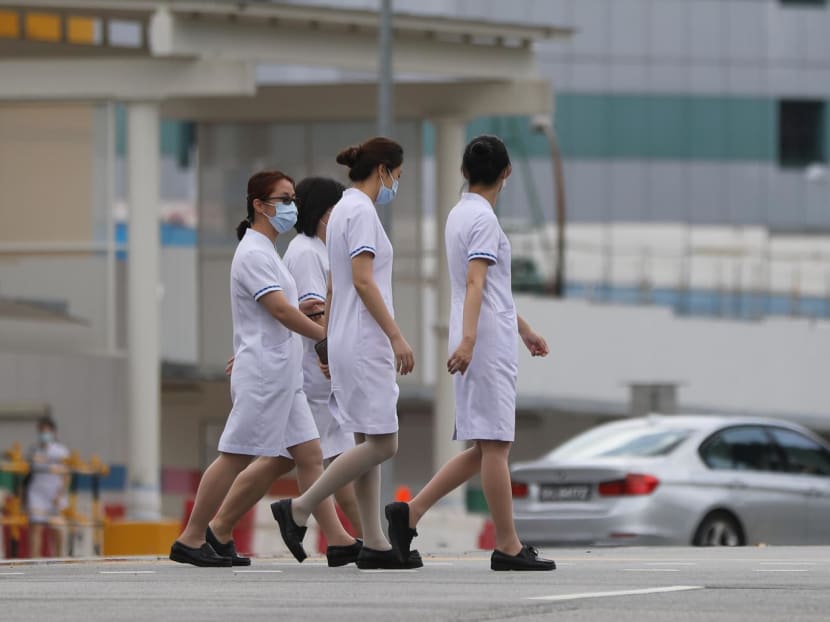Better opportunities, ease of getting residency among reasons foreign nurses leave S'pore to work abroad
SINGAPORE — After giving birth in the Philippines, Ms Cristlynne Grace Abergos thought she would have to endure only a short time apart from her baby when she returned to Singapore to work. But the separation stretched on for two years due to the pandemic and the subsequent closing of borders.

- The attrition rate among foreign nurses in the public sector more than doubled year on year to 14.8 per cent in 2021
- Among local nurses working in the public sector, the attrition rate was 7.4 per cent in 2021, up from 5.4 per cent the previous year
- Foreign nurses said that better pay and the ease of obtaining residency in other countries were among the main reasons they moved abroad
- The exodus of foreign nurses has left local nurses here grappling with the worsening manpower crunch
SINGAPORE — After giving birth in the Philippines, Ms Cristlynne Grace Abergos thought she would have to endure only a short time apart from her baby when she returned to Singapore to work. But the separation stretched on for 18 months due to the pandemic and the subsequent closing of borders.
“It was unbearable,” Ms Abergos, 31, told TODAY. The Filipina worked as a nurse at Yishun Community Hospital for around six years, from March 2015 to December 2021.
For Ms Abergos, the last straw was when she was unable to return home to celebrate her son’s first birthday last year, prompting her to rethink her decision to work in Singapore, as it was difficult to obtain permanent residency and live with her family here.
She has since moved to New Zealand and is living there with her husband and son. She is on an essential skills work visa, a visa category for workers whose skills are in high demand there.
As she is a healthcare worker, Ms Abergos and her family were qualified to apply for residency immediately upon reaching New Zealand, She added that healthcare workers are given priority on the list for those obtaining residency.
Ms Abergos is just one of the many foreign nurses leaving Singapore to continue their nursing careers overseas.
On the exodus of foreign nurses, those who spoke to TODAY gave reasons such as better pay, a desire to live with their families as well as experiences with discrimination.
Ms Rahayu Mahzam, Parliamentary Secretary for Health, said in Parliament on Aug 2 that among resident nurses working in the public sector, the attrition rate was 7.4 per cent in 2021, up from 5.4 per cent the previous year.
For foreign nurses in the public sector, attrition more than doubled year on year to 14.8 per cent in 2021.
Another nurse who decided to move to New Zealand in order to live with his family is 37-year-old Filipino John Palines, who started working in Singapore in 2013.
“I became tired of flying back and forth just to be with my kids because they can only stay for one month in Singapore on a visitor visa,” said Mr Palines, whose two children, aged five and one, lived with his parents in the Philippines while he and his wife were working as nurses here in Changi General Hospital.
“I became tired of flying back and forth just to be with my kids because they can only stay for one month in Singapore on a visitor visa.Filipino John Palines, 37, who left his nursing job in Singapore to work in New Zealand”
“We had very low or close to no chances of applying as a permanent resident. We could not apply for a dependant’s pass for our children as well because we were not eligible,” he said. Mr Palines moved to New Zealand in 2018.
Another big push for his relocation was the discrimination he said that he faced as a foreign nurse.
He recalled a particular incident where a patient’s guardian shouted and “verbally abused” him, as well as blurted out discriminatory remarks as he was a foreigner.
Similarly, 39-year-old Indian national Sheeba Varghese, who worked as a nurse at a public hospital here for 16 years, said that a mixture of factors, including the racism she felt at work, finally pushed her to seek greener pastures in Australia in 2021.
For 31-year-old Filipino Mikko Cumbe, leaving a supportive working environment at KK Women's and Children's Hospital and moving to the United States in March was not an easy decision.
But the ease at which he could obtain a permanent residency in the US, and the opportunities that came with it, such as being able to pursue a Masters degree in nursing — which he could not do here, eventually pushed him to make the move.
He added: “My one-month salary in Singapore is equivalent to what I earn in two weeks here.” Mr Cumbe is being paid an hourly wage at a hospital in North Dakota.
But this exodus has left local nurses here grappling with the lack of manpower, with some considering leaving the country as well.
Another nurse, who wanted to be known only as Shaye, has been working at Jurong Community Hospital for over six years. She said that she has been feeling “overwhelmed” since December, when she started feeling the manpower crunch at her department.
Ms Shaye, 48, a Singaporean, added that since then, five nurses — four foreign nurses and one local nurse, from her department have left and there have been no replacements since.
“We saw a lot of our manpower down this year. We are all feeling very overwhelmed with the workload,” said Ms Shaye, who declined to provide her full name as she is concerned that she would get in trouble with the hospital she is working for.
Previously, Ms Shaye said that there would be at least six to seven nurses during an eight-and-a-half-hour shift, but after people slowly left, it dwindled down to just four nurses per shift taking care of 38 patients.
“On those days that we don’t have extra hands, those are the days that we really struggle,” she said.
She added that with borders reopening and foreign nurses returning home to see their families, the locals are the ones “stuck here facing these challenges”.
“So I really hope that something can be done to help support the manpower crunch so that we can give quality care to our patients,” said Ms Shaye.
Agreeing, Ms Malathi Adimoolam, who worked as a nurse for 34 years, said: “In my experience, we have always been short of manpower and with Covid-19, the situation has become increasingly worse. This has caused local nurses to be overburdened.”
Ms Malathi, a Singaporean, is in her 50s and had retired in 2019.
Watching these foreign nurses seek better opportunities overseas also prompted an undergraduate, Retnamala Kesavan, 37, to consider moving to Australia to work as a nurse there.
Similarly, a nurse at a public hospital who wished to be known only as David said that he plans to live overseas to do his post-graduate studies and work abroad, in order to “experience a new workplace culture on how nurses are treated”.
Mr David, 31, a Singaporean, added that currently, nurses are viewed as blue-collar workers rather than white-collar workers such as doctors and other allied health professionals.
“There is still this hierarchy where doctors have the loudest voice. But every healthcare professional, doctor or not, has a voice,” he said.
Ms Poonam Deet Kaur, 36, a former nurse in Singapore, first left for Australia to work in 2012 before coming back for a spell. She returned to Australia in May this year, saying that she felt more respected as a professional there.
“Here, a registered nurse is given authority to make decisions. Not everything has to go through a doctor. It is very different from Singapore. So I believe that my skills are much more valued and expanded here compared to Singapore,” she said.
Perks also include more attractive salaries and also a lower nurse-to-patient ratio, said Ms Poonam, a Singaporean who currently works at a hospital in Western Australia on a work visa.
In response to TODAY’s queries, Adjunct Associate Professor Tracy Carol Ayre, the group chief nurse at SingHealth, said that it has “ongoing efforts to train aspiring nurses and recruit new nurses”.
“Beyond increasing manpower and support, we look into streamlining the work of our nurses through job redesign, continuous review of nursing processes and piloting various innovations to assist nurses in their work,” she said.
This includes the use of robots, which can help to transport medication and medical specimens, to help “alleviate our nurses’ workload and enable them to focus on critical clinical duties or on spending more time caring for patients with more pressing needs”, she explained.
Meanwhile, a spokesman for the National University Hospital (NUH) said that nurses are in high demand globally and that many foreign nurses would find countries that offer incentives such as family-friendly packages more attractive.
"There is a worldwide nursing shortage and this is a well-recognised issue even prior to the pandemic. The pandemic has exacerbated the existing shortfall and increased the urgency to increase nursing workforce in all countries," said NUH's chief nurse, Ms Joann Pang.
The hospital, she said, is boosting manpower both locally and internationally to "combat exhaustion and reinforce support" to staff.
In particular, is it "committed to continue growing the local workforce" and values returning staff who have the passion to continue their work in healthcare, she said.
Ms Pang said that some locum nurses who worked with NUH previously have now joined them full-time along with former nurses who had left previously due to family commitments.
Other ways it is helping staff is to provide a range of flexible work arrangements such as part-time employment and staggered hours.
Tan Tock Seng Hospital noted that during the pandemic, many countries have reported higher number of nurses leaving the profession, and this trend is also experienced by the hospital.
Its chief nurse Hoi Shu Yin said: "We have introduced initiatives to mitigate the impact of attrition and these include augmenting our staffing with locum nurses and healthcare assistants.
"Efforts were made to optimise their roles through enhanced training so that they could achieve a higher level of competence.
"Other efforts including reducing workload through process redesign, digitalisation and adoption of technology such as the use of robots to substitute delivery of non-clinical tasks."
Dr Hoi added that initiatives are ongoing to retain both foreign and local nurses.













